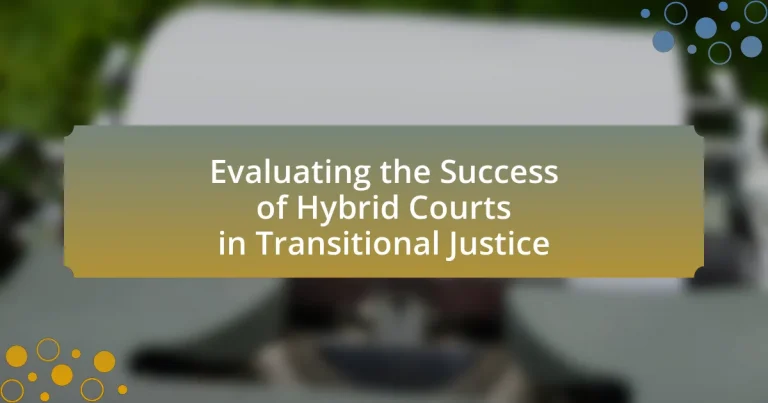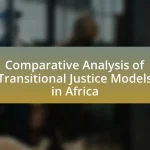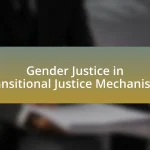Hybrid courts are judicial bodies that integrate domestic and international legal elements to address crimes committed during conflicts or authoritarian regimes, playing a vital role in transitional justice. This article evaluates the success of hybrid courts by examining their defining characteristics, differences from traditional courts, and their impact on accountability and reconciliation processes. It also discusses the challenges these courts face, including issues of legitimacy, political interference, and resource constraints, while highlighting best practices and lessons learned from successful cases like the Special Court for Sierra Leone and the Extraordinary Chambers in the Courts of Cambodia. Key factors for assessing their effectiveness, such as stakeholder engagement and community trust, are also explored, providing a comprehensive overview of the operational dynamics of hybrid courts in promoting justice and social cohesion.
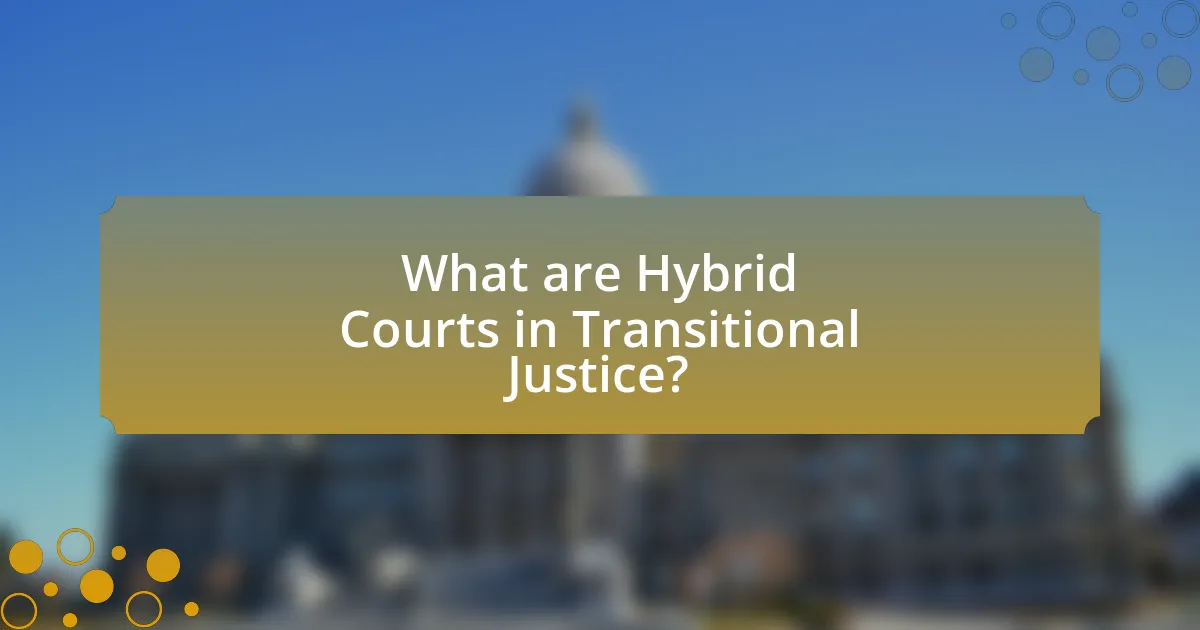
What are Hybrid Courts in Transitional Justice?
Hybrid courts in transitional justice are judicial bodies that combine elements of both domestic and international law to address crimes committed during periods of conflict or authoritarian rule. These courts aim to enhance accountability and promote reconciliation by integrating local legal practices with international standards, thereby fostering legitimacy and trust within affected communities. An example of a hybrid court is the Special Court for Sierra Leone, established in 2002, which prosecuted war crimes and crimes against humanity committed during the Sierra Leone Civil War, demonstrating the effectiveness of such courts in bridging local and international legal frameworks.
How do Hybrid Courts differ from traditional courts?
Hybrid courts differ from traditional courts primarily in their composition and jurisdiction. Hybrid courts typically combine elements of both domestic and international legal systems, incorporating local judges and legal practices alongside international legal standards and personnel. This structure aims to enhance legitimacy and cultural relevance in post-conflict societies, as seen in the Special Court for Sierra Leone, which included both Sierra Leonean and international judges to address war crimes. In contrast, traditional courts usually operate solely within a national legal framework, relying on domestic laws and judges without international involvement. This distinction highlights how hybrid courts seek to balance local needs with international legal norms, thereby fostering greater acceptance and effectiveness in transitional justice contexts.
What are the defining characteristics of Hybrid Courts?
Hybrid courts are characterized by their combination of international and domestic legal elements, which allows them to address serious crimes while incorporating local legal traditions. These courts typically involve both international and national judges, prosecutors, and legal staff, ensuring a blend of expertise and perspectives. Additionally, hybrid courts often operate under a legal framework that includes both international law and the host country’s laws, promoting legitimacy and local ownership of the judicial process. For instance, the Special Court for Sierra Leone, established in 2002, exemplifies these characteristics by integrating international standards with Sierra Leonean law to prosecute war crimes and crimes against humanity.
Why are Hybrid Courts considered a unique approach to justice?
Hybrid courts are considered a unique approach to justice because they combine elements of both domestic and international legal systems to address serious crimes, particularly in post-conflict settings. This integration allows for the incorporation of local legal traditions and practices alongside international standards, fostering greater legitimacy and acceptance within the affected communities. For instance, the Special Court for Sierra Leone, established in 2002, exemplifies this model by blending Sierra Leonean law with international humanitarian law, thereby enhancing the court’s relevance and effectiveness in delivering justice.
What role do Hybrid Courts play in transitional justice?
Hybrid courts play a crucial role in transitional justice by combining international and domestic legal frameworks to address serious crimes and promote accountability. These courts aim to bridge the gap between local legal traditions and international human rights standards, thereby enhancing legitimacy and fostering trust in the judicial process. For instance, the Special Court for Sierra Leone, established in 2002, successfully prosecuted key figures for war crimes while incorporating local legal practices, which contributed to national reconciliation efforts. This integration of diverse legal perspectives helps ensure that justice is perceived as fair and relevant to the affected communities, ultimately supporting the broader goals of transitional justice.
How do Hybrid Courts contribute to reconciliation processes?
Hybrid courts contribute to reconciliation processes by combining international and local legal practices to address past atrocities while fostering trust in the judicial system. These courts often involve local judges and prosecutors, which helps to ensure that the legal proceedings are culturally relevant and accepted by the affected communities. For instance, the Special Court for Sierra Leone, established in 2002, integrated local customs and norms into its operations, which facilitated greater community engagement and acceptance of the judicial outcomes. This approach not only promotes accountability for crimes but also encourages dialogue among conflicting parties, thereby aiding in the healing process and rebuilding social cohesion.
What impact do Hybrid Courts have on victims and communities?
Hybrid courts significantly impact victims and communities by providing a platform for justice that incorporates both international and local legal standards. This dual approach enhances the legitimacy of the judicial process, fostering trust among affected communities. For instance, the Special Court for Sierra Leone, established in 2002, allowed victims to participate in the proceedings, which not only acknowledged their suffering but also empowered them by giving them a voice in the justice process. Furthermore, hybrid courts often contribute to community reconciliation by addressing grievances and promoting accountability, which can lead to a reduction in tensions and a more stable post-conflict environment. Studies have shown that when victims feel heard and see perpetrators held accountable, it can lead to improved community relations and a stronger social fabric.
What are the key factors in evaluating the success of Hybrid Courts?
The key factors in evaluating the success of Hybrid Courts include their ability to deliver justice, promote accountability, ensure victim participation, and enhance local ownership. The effectiveness of Hybrid Courts is often measured by their capacity to prosecute serious crimes, such as war crimes and crimes against humanity, which contributes to the rule of law and deters future violations. Additionally, the level of engagement and satisfaction among victims and affected communities is crucial, as it reflects the courts’ legitimacy and social impact. Local ownership is also significant, as it fosters trust and acceptance within the community, ensuring that the judicial processes resonate with local values and norms. These factors collectively determine the overall effectiveness and sustainability of Hybrid Courts in transitional justice contexts.
What metrics are used to assess the effectiveness of Hybrid Courts?
Metrics used to assess the effectiveness of Hybrid Courts include case throughput, quality of judicial decisions, victim satisfaction, and compliance with international legal standards. Case throughput measures the number of cases processed within a specific timeframe, indicating efficiency. Quality of judicial decisions is evaluated through the consistency and fairness of rulings, often assessed by legal experts. Victim satisfaction surveys gauge the perceived fairness and accessibility of the court process, reflecting public trust. Compliance with international legal standards is measured by adherence to human rights norms and procedural fairness, ensuring legitimacy. These metrics collectively provide a comprehensive evaluation of Hybrid Courts’ performance in transitional justice contexts.
How do stakeholder perceptions influence evaluations of success?
Stakeholder perceptions significantly influence evaluations of success by shaping the criteria and benchmarks used to assess outcomes. For instance, stakeholders such as victims, government officials, and international organizations may prioritize different aspects of hybrid courts, such as fairness, accountability, or restorative justice. Research indicates that when stakeholders perceive a hybrid court as legitimate and effective, they are more likely to view its outcomes as successful, as seen in the case of the Special Court for Sierra Leone, where local and international perceptions aligned on the court’s role in promoting justice. This alignment enhances the perceived legitimacy of the court’s decisions and contributes to a broader acceptance of its success in transitional justice contexts.

What challenges do Hybrid Courts face in achieving success?
Hybrid courts face significant challenges in achieving success, primarily due to issues related to legitimacy, funding, and political interference. Legitimacy concerns arise when local populations perceive hybrid courts as foreign impositions rather than legitimate judicial bodies, which can undermine their effectiveness. Funding challenges often stem from reliance on international donors, leading to financial instability that affects court operations and personnel. Political interference can compromise judicial independence, as local governments may attempt to influence proceedings to protect their interests or those of powerful individuals. These factors collectively hinder the ability of hybrid courts to deliver justice effectively and maintain public trust.
How do political influences affect the functioning of Hybrid Courts?
Political influences significantly affect the functioning of Hybrid Courts by shaping their legitimacy, operational independence, and effectiveness. For instance, when local governments exert pressure on Hybrid Courts, it can lead to biased judicial outcomes, undermining the courts’ impartiality and credibility. A notable example is the Special Court for Sierra Leone, where political interference impacted the prosecution of war crimes, demonstrating how local political dynamics can hinder justice processes. Furthermore, the involvement of international actors can either bolster or complicate the courts’ operations, depending on the alignment of their interests with local political agendas. This interplay illustrates that political contexts are crucial in determining the success and integrity of Hybrid Courts in transitional justice scenarios.
What are the implications of government interference in Hybrid Courts?
Government interference in Hybrid Courts undermines their impartiality and effectiveness. Such interference can lead to biased judicial outcomes, eroding public trust in the legal system. For instance, when governments exert pressure on judges or influence case proceedings, it compromises the courts’ ability to deliver justice fairly. Historical examples, such as the Special Court for Sierra Leone, illustrate that governmental pressure can hinder investigations and prosecutions, ultimately affecting the court’s legitimacy and the broader goals of transitional justice.
How do security concerns impact the operations of Hybrid Courts?
Security concerns significantly impact the operations of Hybrid Courts by influencing their ability to function effectively and safely. These courts often operate in post-conflict environments where threats to personnel, witnesses, and judges are prevalent, which can lead to delays in proceedings and reduced participation from key stakeholders. For instance, the establishment of the Special Court for Sierra Leone faced challenges due to threats against witnesses, resulting in the implementation of protective measures that complicated the court’s operations. Additionally, security issues can deter victims from coming forward to testify, undermining the court’s legitimacy and effectiveness in delivering justice.
What are the common criticisms of Hybrid Courts?
Common criticisms of hybrid courts include concerns about their legitimacy, effectiveness, and the potential for political interference. Critics argue that hybrid courts often lack full sovereignty, which can undermine their authority and credibility in the eyes of local populations. Additionally, there are concerns regarding the balance of international and domestic legal standards, which may lead to inconsistencies in justice delivery. Furthermore, the involvement of international actors can result in perceptions of neocolonialism, where local voices are marginalized. Studies have shown that these factors can hinder the courts’ ability to achieve their intended goals of accountability and reconciliation in post-conflict societies.
How do issues of legitimacy arise in Hybrid Courts?
Issues of legitimacy in Hybrid Courts arise primarily from the perceived lack of authority and acceptance by local populations. These courts often combine international and domestic legal frameworks, leading to questions about their impartiality and effectiveness. For instance, when local communities view these courts as imposed by foreign entities rather than as legitimate institutions of justice, it undermines their credibility. Additionally, the dual nature of Hybrid Courts can create confusion regarding jurisdiction and the application of laws, further complicating their acceptance. Historical examples, such as the Special Court for Sierra Leone, illustrate how local skepticism about foreign involvement can challenge the legitimacy of judicial processes, impacting the overall success of transitional justice efforts.
What are the limitations of Hybrid Courts in delivering justice?
Hybrid courts face several limitations in delivering justice, primarily due to issues of legitimacy, resource constraints, and political interference. The legitimacy of hybrid courts can be questioned as they often operate in post-conflict environments where local populations may view them as imposed by external actors, undermining their authority and acceptance. Resource constraints, including insufficient funding and lack of trained personnel, can hinder their operational effectiveness, leading to delays and inadequate legal processes. Furthermore, political interference can compromise the independence of hybrid courts, as local governments may exert pressure on judicial outcomes, affecting impartiality and fairness. These factors collectively impede the ability of hybrid courts to achieve their intended goals of justice and accountability in transitional contexts.
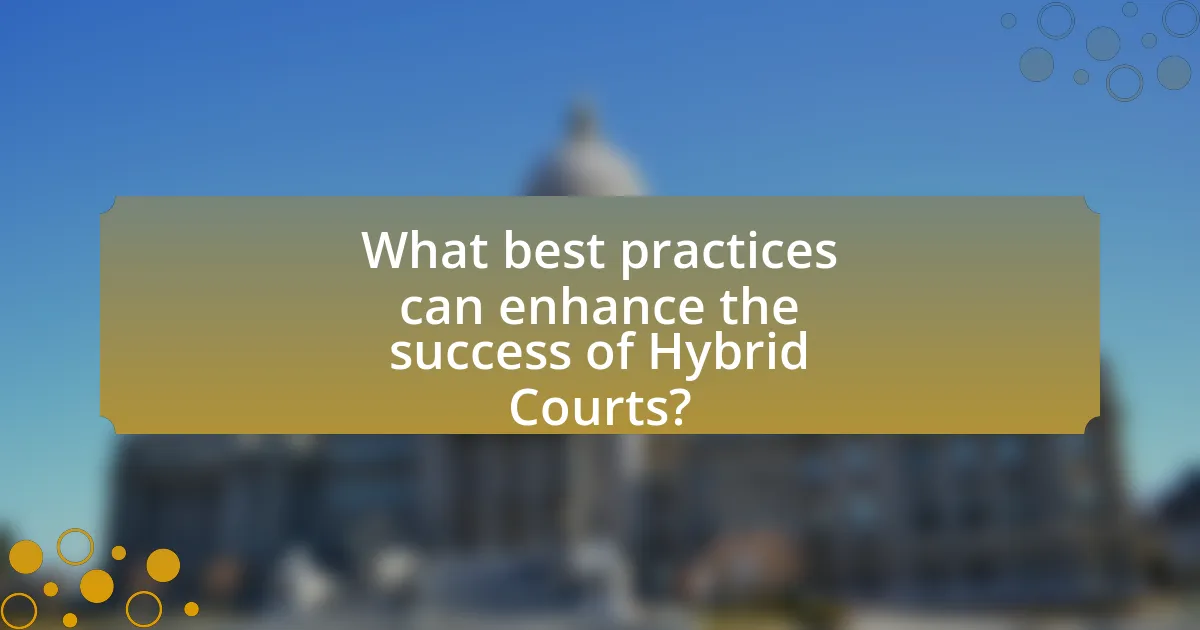
What best practices can enhance the success of Hybrid Courts?
Best practices that can enhance the success of Hybrid Courts include ensuring a clear legal framework, promoting local ownership, and fostering international cooperation. A clear legal framework provides the necessary guidelines and authority for the court’s operations, which is essential for legitimacy and effectiveness. Promoting local ownership involves engaging local communities and stakeholders in the court’s processes, which can enhance trust and acceptance. International cooperation, including support from international organizations and states, can provide resources, expertise, and legitimacy, as evidenced by the successful implementation of the Special Court for Sierra Leone, which combined local and international legal principles to address war crimes effectively.
How can stakeholder engagement improve Hybrid Court outcomes?
Stakeholder engagement can significantly improve Hybrid Court outcomes by fostering trust, enhancing legitimacy, and ensuring that diverse perspectives are considered in the judicial process. Engaging stakeholders, including local communities, victims, and civil society organizations, allows for a more inclusive approach that reflects the needs and expectations of those affected by the court’s decisions. Research indicates that when stakeholders are actively involved, there is a higher likelihood of compliance with court rulings and greater public support for the judicial process, as seen in the experiences of the Special Court for Sierra Leone, where community involvement led to increased acceptance of the court’s authority and decisions.
What strategies can be implemented to foster community trust?
To foster community trust, hybrid courts can implement strategies such as inclusive stakeholder engagement, transparent communication, and consistent accountability measures. Inclusive stakeholder engagement involves actively involving community members in the judicial process, ensuring their voices are heard and considered, which has been shown to enhance legitimacy and trust in legal institutions. Transparent communication entails providing clear, accessible information about court proceedings and decisions, which helps demystify the judicial process and builds confidence among community members. Consistent accountability measures, such as regular assessments of court performance and responsiveness to community feedback, reinforce trust by demonstrating that the courts are committed to serving the community’s interests and upholding justice. These strategies are supported by research indicating that participatory approaches in transitional justice lead to greater public trust and cooperation with legal institutions.
How can training and capacity-building initiatives support Hybrid Courts?
Training and capacity-building initiatives can significantly enhance the effectiveness of Hybrid Courts by equipping legal personnel with the necessary skills and knowledge to navigate complex legal frameworks. These initiatives provide targeted education on international law, human rights standards, and procedural norms, which are essential for the proper functioning of Hybrid Courts that blend domestic and international legal principles. For instance, programs that focus on the unique challenges of prosecuting war crimes or human rights violations can improve the competency of judges and prosecutors, leading to more informed and fair judicial outcomes. Furthermore, research indicates that well-trained personnel are more likely to uphold the rule of law and ensure accountability, which is crucial for the legitimacy and success of Hybrid Courts in transitional justice contexts.
What lessons can be learned from successful Hybrid Courts?
Successful hybrid courts demonstrate the importance of integrating local legal traditions with international standards to enhance legitimacy and effectiveness. For instance, the Special Court for Sierra Leone combined international and domestic legal practices, which helped to gain local support and foster trust in the judicial process. Additionally, successful hybrid courts highlight the necessity of ensuring adequate resources and training for personnel, as seen in the Extraordinary Chambers in the Courts of Cambodia, which improved the quality of legal proceedings. Furthermore, these courts illustrate the value of community engagement and outreach, as effective communication with local populations can increase awareness and support for transitional justice efforts.
Which case studies exemplify effective Hybrid Court practices?
The case studies that exemplify effective Hybrid Court practices include the Special Court for Sierra Leone (SCSL) and the Extraordinary Chambers in the Courts of Cambodia (ECCC). The SCSL, established in 2002, successfully prosecuted key leaders of the civil war in Sierra Leone, utilizing a mix of international and local legal standards, which enhanced legitimacy and local ownership. The ECCC, operational since 2006, has focused on crimes committed during the Khmer Rouge regime, combining Cambodian and international law to address historical injustices while fostering national reconciliation. Both courts have demonstrated effectiveness through their ability to engage local communities, uphold legal standards, and deliver justice, thereby contributing to transitional justice in their respective contexts.
What innovations have emerged from successful Hybrid Courts?
Successful Hybrid Courts have introduced innovations such as the integration of local legal traditions with international legal standards, enhancing legitimacy and cultural relevance in transitional justice processes. These courts have also pioneered the use of mixed panels comprising both international and domestic judges, which fosters knowledge transfer and capacity building within local judicial systems. Furthermore, successful Hybrid Courts have implemented victim-centered approaches, ensuring that the voices of victims are prioritized in proceedings, thereby promoting restorative justice. Evidence of these innovations can be seen in the Special Court for Sierra Leone, which effectively combined international law with Sierra Leonean customary law, resulting in a more accepted and effective judicial process.
What practical recommendations can be made for future Hybrid Courts?
Future Hybrid Courts should prioritize the integration of local legal traditions and practices to enhance legitimacy and acceptance within affected communities. This approach is supported by the success of the Special Court for Sierra Leone, which incorporated customary law elements, fostering local trust and participation. Additionally, establishing clear and transparent funding mechanisms is crucial to ensure sustainability and independence from political influences, as evidenced by the challenges faced by the Extraordinary Chambers in the Courts of Cambodia due to financial instability. Lastly, training local personnel in international legal standards can improve the effectiveness of hybrid courts, as demonstrated by the positive outcomes in the Kosovo Specialist Chambers, where local judges and staff were equipped to handle complex legal issues.
